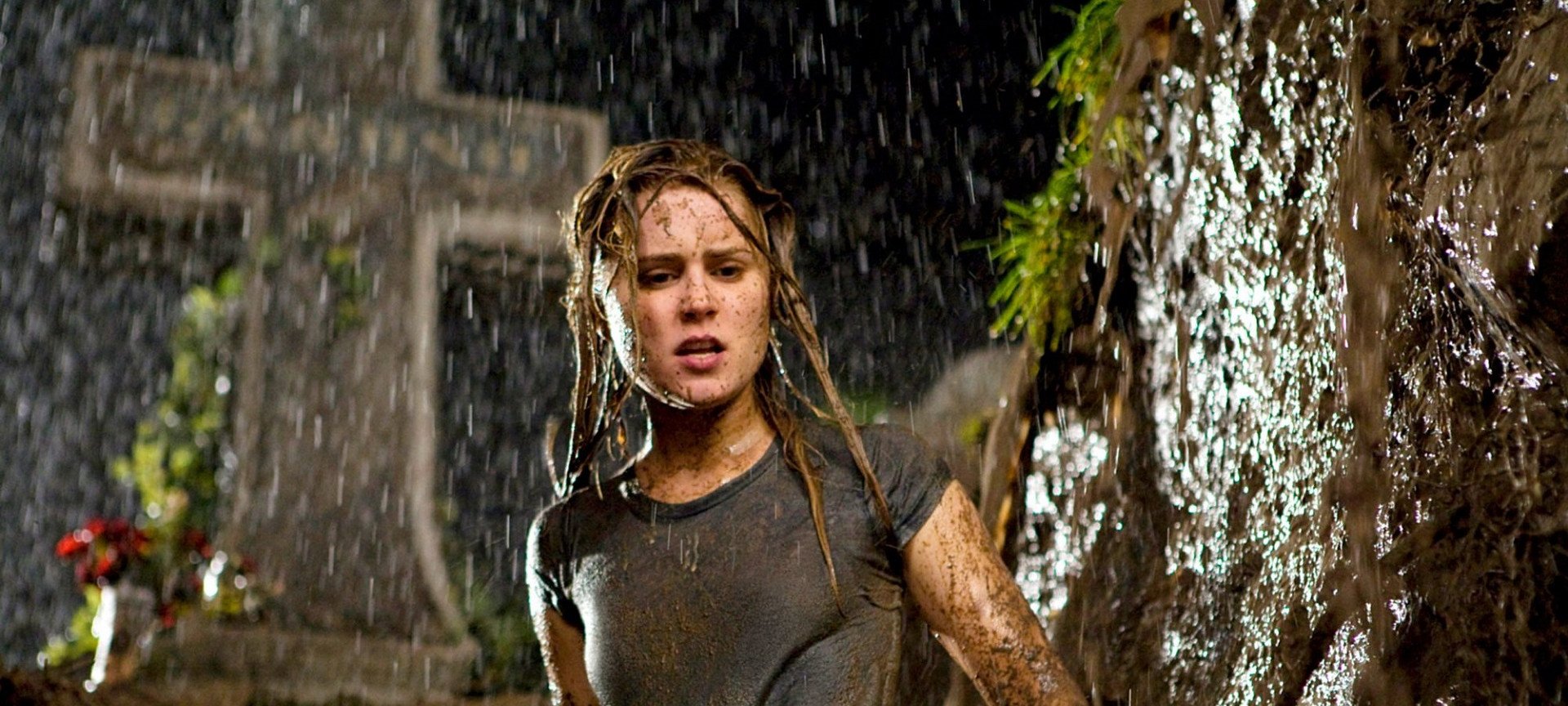
Drag Me to Hell (Sam Raimi, 2009, 99 min.)
Sam Raimi is the greatest horror stylist of the late 20th and early 21st centuries, and he reaffirms that title in the first three or four minutes of his triumphant return to the genre that started his career, Drag Me to Hell—and this occurs before the opening credits even roll. Those credits, and the film, are an homage to the horror comics of Raimi’s youth, the kind of gruesome schlock that Tales from the Crypt purveyed with gleeful sadism. It’s been a long time since Raimi has indulged in this kind of manic, brilliant horror-comedy, but he roars out of the gate, proving that he hasn’t lost his touch. In fact, he’s honed it.
It’s the story of a principled loan officer (Alison Lohman) who, up for a promotion, decides to take a hard line to impress her boss. Unfortunately, the first and only victim of her brief tenure as a soulless corporate drone is a gypsy woman (Lorna Raver) who, after begging on her knees for an extension, puts a hex on Lohman: in three days, demons will drag her into hell. No promotion is worth such a price, not even the assistant manager’s desk. After a rabid, dizzying battle with the gypsy woman in a deserted parking garage, and subsequent visitations by creepy shadows, evil giggling, and invisible body-slams, Lohman becomes convinced, even if everyone around her, who of course can’t see or hear her tormentors, thinks she’s crazy. She seeks assistance from the spirit world, but learns that there are as many rules for demonic vengeance as there are for corporate loans—and just as many ways to screw up.
One of my biggest pet peeves in horror films is the gratuitous use of shock-cuts accompanied by loud noises to elicit unearned shrieks from the audience, a staple of dozens, if not hundreds, of forgettable shockers. But to every rule there is an exception, and Raimi reminds us over and over again that he’s the exception to a lot of rules. He’s an artist of audience manipulation, able to make us afraid, make us laugh, make us scream, and—most importantly—make us wait in dreadful anticipation. This film is a symphony of emotional manipulation, and Raimi conducts it with style, wit, and grace, weaving together shock-cuts and silently palpable tension, gruesome gore and quiet moments of tenderness, slapstick comedy and dead-serious demons into a tapestry that forces me to mix my metaphors to even attempt to encompass everything it accomplishes.
What distinguishes this film from his Evil Dead trilogy is that, despite the often hilarious edge to the shocks, there’s a sense that something’s actually at stake here, a trick Raimi probably learned in that unlikeliest of places, the superhero genre. Not that we didn’t care about poor Ash, the doomed and doomed again hero who emerged from the Evil Dead films as a wisecracking superman. But the extreme physical abuse, terror, loss of blood and friends, and mayhem Raimi subjected him to were the point. This time around, we’re dealing with real people, making us care a little bit more. The film’s biggest problem might be that Alison Lohman isn’t a very interesting actress—would that Elliott Page had worked out—but the Raimis (Sam wrote with his brother Ivan) obviously care about her enough for some of that affection to rub off (and her willingness to submit to the horrors Raimi subjects her to makes me give her a break). And she’s surrounded by other people to invest in emotionally: Justin Long as her longsuffering boyfriend, an actor who is quickly emerging as a likable everyman, something I never saw coming; Dileep Rao, in the unlikely character of an Indian seer who becomes her guide to the spirit world, brings a gentleness and calm to the proceedings every time he’s onscreen (a calm that Raimi usually exploits to lull us into a false sense of security); even David Paymer, as Christine’s evil boss, gives a layered performance as a corporate drone whose evil comes not from within but from the financial structure he inhabits.
I can’t remember the last time I had so much fun at the movies, and that experience—being at the movies—is essential to a true enjoyment of this film. It’s built on a love of old movies, on the special camaraderie that exists when you’re sitting there in the dark, screaming and laughing with a bunch of strangers. Raimi ensures that you’ll do plenty of both.

